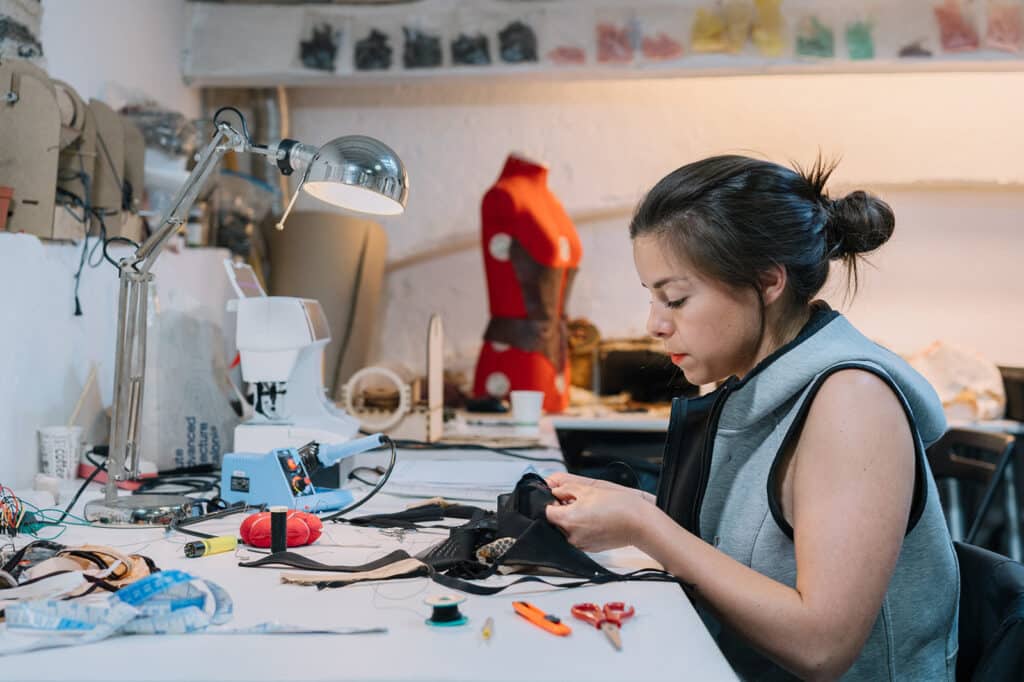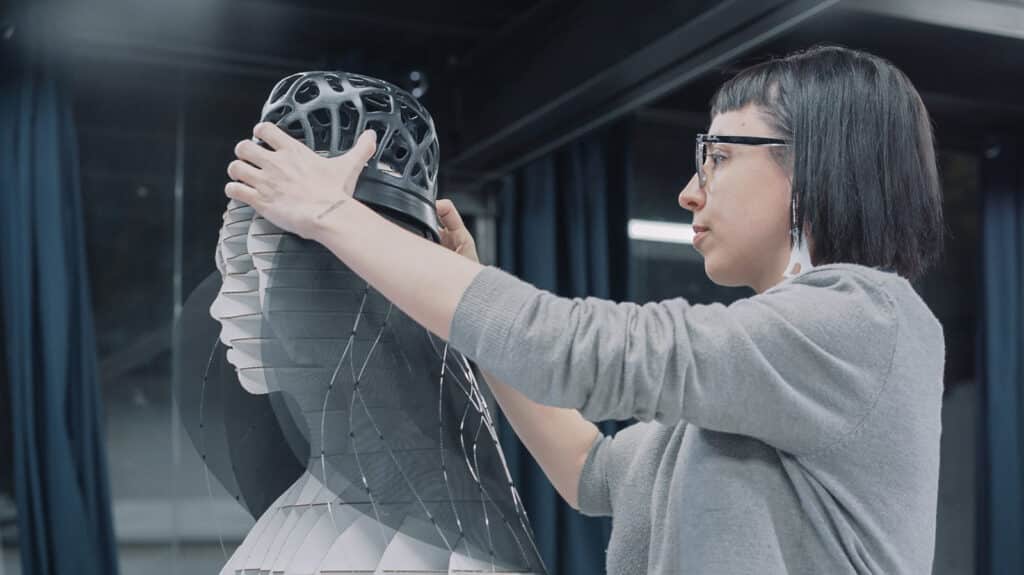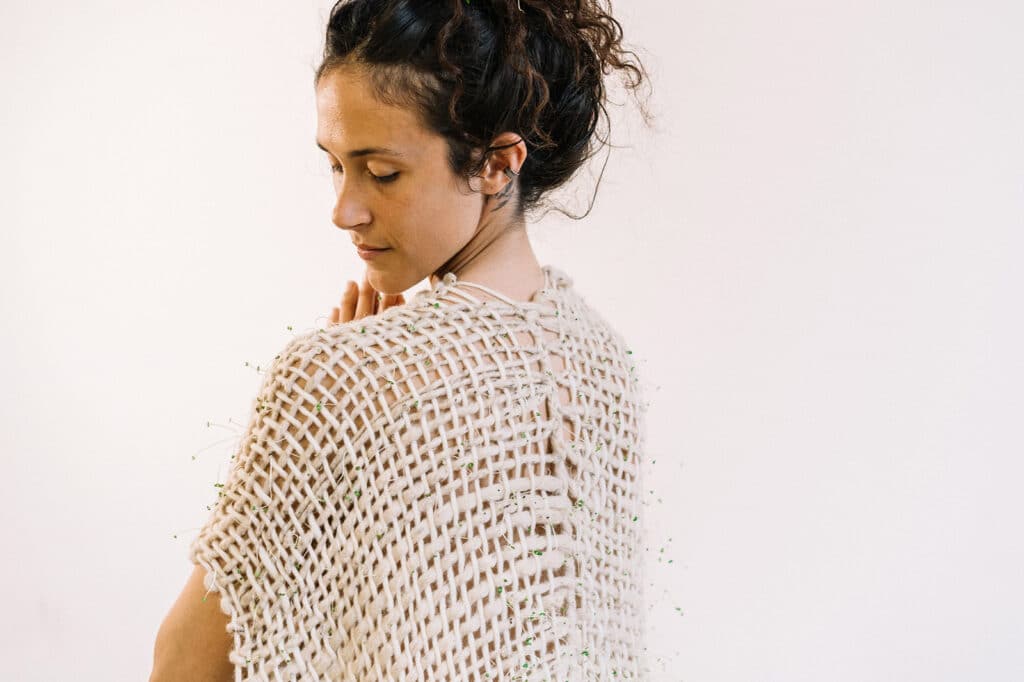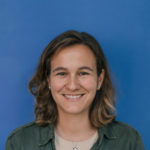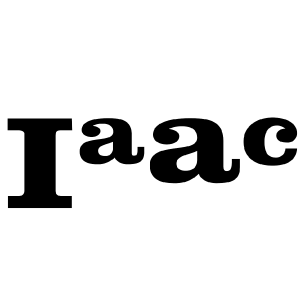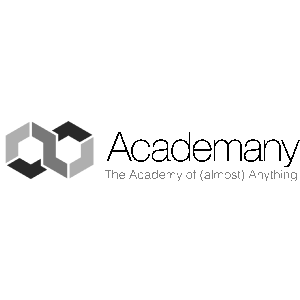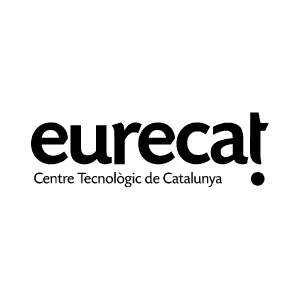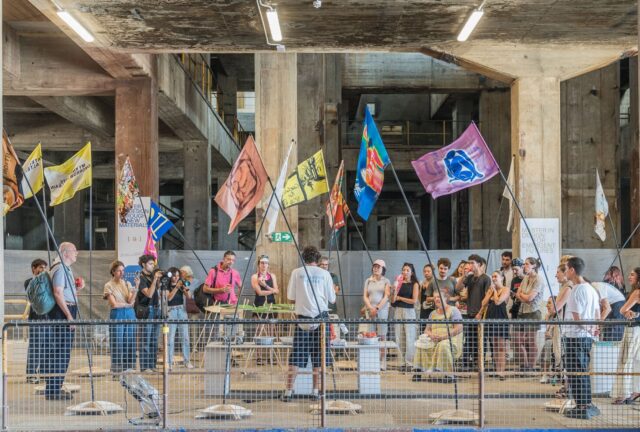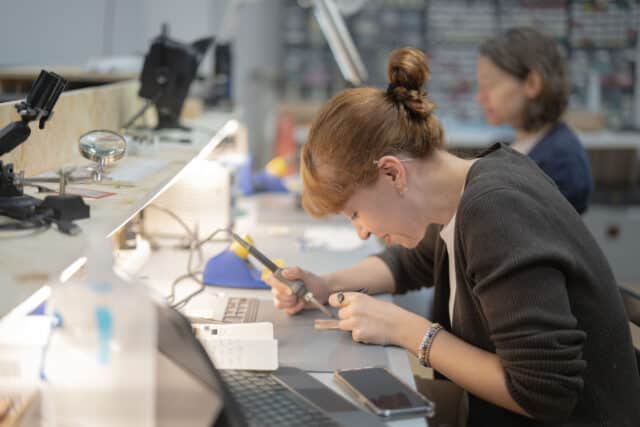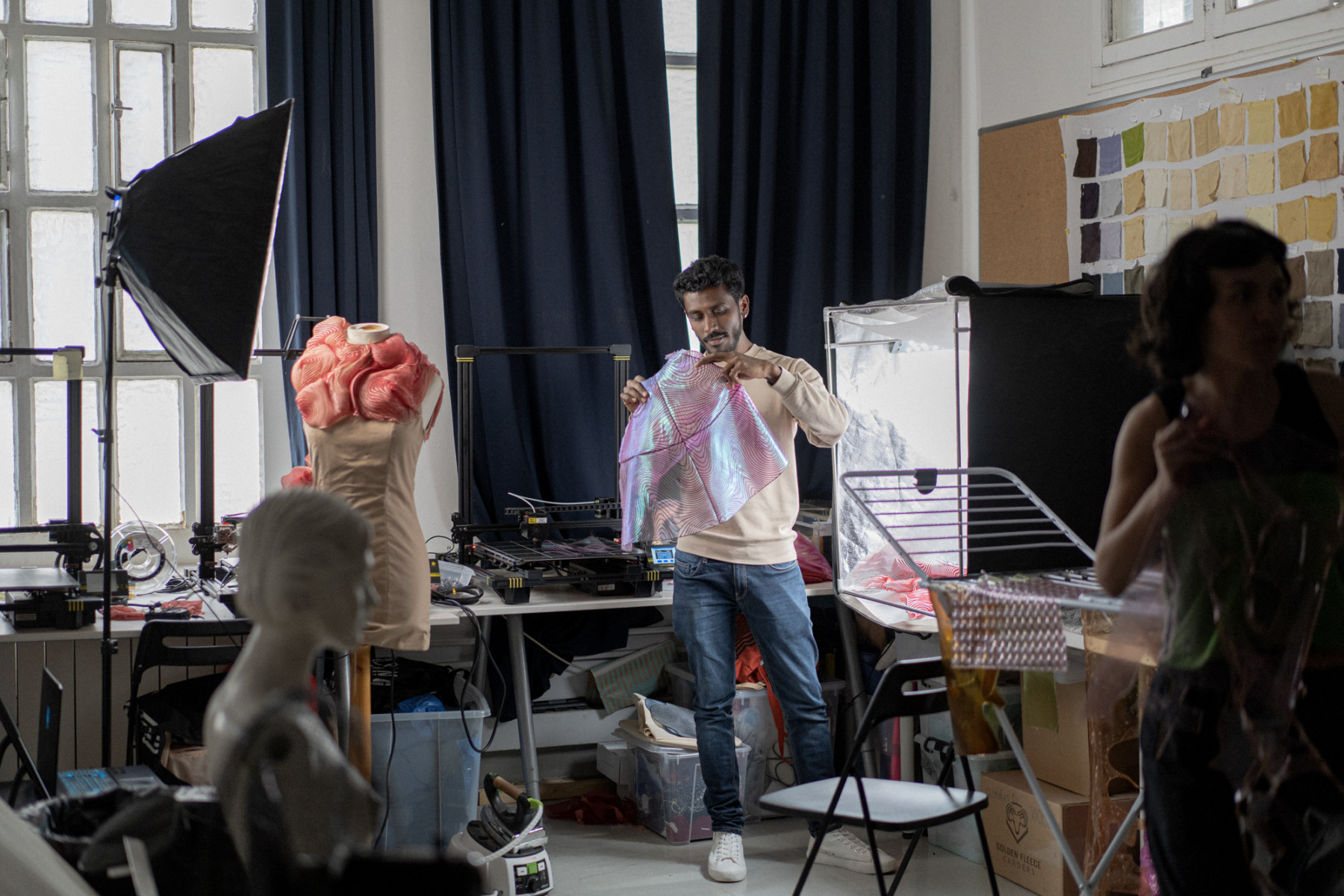
Postgraduate in Textiles & Technology – Fabricademy BCN
A journey at the intersection between circular fashion, digital fabrication and biology
The Postgraduate in Textiles & Technology – Fabricademy BCN, is a 6-month intensive program that explores the interrelation of human-technology-environment through the notions of embodiment, materiality, ecodesign, biodesign, performance, smart textiles and digital fabrication. Its mission is to (re)shape and (re)define the implications and applications of technology in the textile and clothing industry, from the fashion sector to the upcoming wearable market. The program offers a broad overview of the state of the art of the current industry and builds on “learning by doing” methodologies, tackling themes like personal fabrication, distributed manufacturing, industry 4.0, wearable technology, biofabrication, assistive technologies and sustainability.
Degree
The Postgraduate in Textiles & Technology – Fabricademy BCN is accredited by University of Lleida (UdL) – European Higher Education Area (EHEA)
Course Length
Inctive for 2025-26
Presentation
Change how you think, not just what you wear
The textile industry is in need of more humane, ecologically sound and efficient ways of working. We often buy, consume and throw products without any concept of environmental damage. This can be due to a lack of knowledge and education about materials – from the energy consumed in production, labour and waste produced at the end of the cycle. Fabricademy at Fab Lab Barcelona equips students with the skills and knowledge to critically reflect on these matters and become key players in an emerging sustainable future of textiles.
The program and educational environment encourages students to rethink industrial processes regarding textile production and design. Merging tradition and advanced technologies, students learn a range of skills from digital fabrication to synthetic biology and work across the creation, production and distribution of textile and fashion elements to help them establish their career as future textile professionals. Learning is supported by experts from the field who help students investigate how the textile and fashion industries can benefit from new technologies, processes and business models.
An environment which encourages creativity
The possibilities to conduct experimental research in an open laboratory give students the physical and mental space for innovative re-thinking and reframing of today’s realities, offering the resources for visions to be materialised, tested, developed and fabricated, not as a linear process, but as a spiral iteration and implementation into reality. Through the program, we are developing and implementing a new approach on how to create, produce and distribute textile and fashion elements, by using distributed manufacturing infrastructures and knowledge networks.
Working in an open laboratory, students experiment with the human body and culture by recycling, hacking and sensing. Rapid prototyping is used to create real-time feedback loops for project development, in which materials, aesthetics, sustainability and customization play equal and important roles. Students use acquired knowledge to develop a final project which may intersect multiple sectors of the future textile and fashion industry.
From 3D-printed shoes to kombucha fabric
Previous graduates of Fabricademy have worked on creating and fabricating interactive 3D-printed footwear, biodegradable garments, wearable smart hats, energy-harvesting clothing, whole 3D-printed garments, textile micro-factory pilots and more. The projects seek to test, envisage and re-establish our production and consumption models in the context of advanced manufacturing. Through hands-on learning techniques and critical reflection, students develop innovative methodologies and designs which work towards creating a compassionate, sustainable future for the textiles industry. The program collaborates with Eurecat and Reimagine Textile project, in which students have access and training to complete the infrastructure of textile manufacturing facilities and testing machines.
Students are mentored by Anastasia Pistofidou, co-founder of Material and Textile research body FabTextiles, Fabricademy and academic director of the global Fabricademy program. With dedicated biomaterial labs, access to two professional Fab Labs and a third lab at Valldaura Campus of IAAC in the Collserola National Park, Fabricademy Barcelona provides an unprecedented experience for students to study in a unique environment. The international IAAC environment welcomes students from 68 countries and over 200 disciplines, which provides all students on campus the opportunity to expand their professional and personal experiences. Alumni of the program have used their future-skills to build leading roles in the global Fab Lab network, established their own design studios and became entrepreneurs in the innovation and new materials fields.
- REQUEST APPLICATION
Apply to get more information
Research Lines
The content of the course is structured into 3 areas of research:
Sustainability
Exploring the role of future eco-pioneers and material designers for a circular and sustainable textile and clothing field, bringing together craftsmanship knowledge and disruptive technologies. The lectures and hands-on learning sessions offer a view on the past and future of sustainable craftsmanship: an array of techniques for environmentally friendly alternatives for the fields of textile and clothing. This sustainability area of research clusters knowledge from biomaterials, natural pigment & dyes fabrication, modular reconfigurable laser cut designs, and the solidification of soft fabrics into hard-structures for technical textile applications. It also introduces the participants to basic biotechnology practices.
Industry 4.0
Developing skills and exploring the field of new technologies such as 3D scanning, 3D printing (additive manufacturing), parametric design and 3D modelling, as well as subtractive manufacturing, such as CNC milling and laser cutting. A combination of intensive workshops, where participants learn how to create digital files for apparel, fashion and accessories that are enabling mass customization, local manufacturing and reshape the factories of the Future through a performance-based hands-on approach to design.
Wearable Technology
The Wearable tech research area focuses on the design and integration of electronics with and as textiles for the development of smart fabrics that are aesthetically and performance-wise enhanced with microcontrollers, sensors, actuators and programmable logics. Participants will obtain basic programming, hardware design and circuit crafting skills in order to create interactive prototypes using conductive threads, fabrics, e-embroidery and other techniques. The projects can be developed for a broad range of applications, from performative arts to healthcare solutions.
Skills

Design
Digital Bodies
Circular open-source Fashion
Wearables
Management
Documentation
Project Management
State of the art
Project proposal Presentation

Electronics
Soft Robotics
E-textiles
Skin Electronics
Materials
Open-source Hardware, “from fibres to fabric”
Textile as Scaffold
Biofabricating Materials
Who can join?
We wish to reach all creative disciplines dealing with design and the Maker Movement: creative players, makers, designers, artists, architects, scientists, students and others.
Fashion Designers
For existing fashion designers who are seeking new and innovative ways of working with textiles – whether this is with biomaterials, 3D printed clothing, interactive wearables and more. Fabricademy gives the option for fashion designers to become more sustainable in their practice.
Designers
We hope to benefit and increase the number of designers and creatives that self-produce goods by integrating resources they don’t have access to. Utilising digital platforms for all aspects of the creation process, to financing and execution.
Makers
This global movement merges artisanal skills with a digital layer of tools. We hope to benefit from this global community of do-ers by enhancing the connectivity between them and the spaces in which they work such as Fab Labs.
Faculty
Partners
FAQ’s
What do I need to do before starting Fabricademy?
Ideally, check tutorials on the subjects you don’t know. This will help you familiarize with key concepts and the learning experience will be smooth. Any 3D modelling software, with a preference to Rhinoceros 3D 👉 Check tutorials
What if I have never done programming or fabrication before?
Don’t worry! Fabricademy can be taken on many levels… If you have no background in the subjects of the course, you will get all the basics to learn and produce your assignments. We suggest that you check some tutorials before coming, that will make you feel more confident at the beginning 👉 Check tutorials
What kind of job can I get after doing Fabricademy?
The world of jobs is changing rapidly. Fabricademy gives you the chance to broaden your scope of what is possible in your professional scope or inspire you to find a new path. Take a look at the professional pathways you could undertake after Fabricademy in our dedicated blogpost!
What do I need for the class?
Bring your laptop and be ready to change your life!
Can I get my company to pay for this?
Of course! Many companies support their employees to take crash courses and advance their team’s skill set. Fabricademy is an excellent opportunity to bootstrap your knowledge both in technical matters as well as project management and development.
Can I learn Fabricademy on my own?
Yes! Fabricademy content is free. All class instructions are posted every year in the Fabricademy Archive.
What we offer with the fee is access to infrastructure and support, you can see the details here. Fab Lab Barcelona is one of the largest Fab Labs in Europe – a pioneer within the network and part of a renowned international Institution – the Institute for Advanced Architecture of Catalonia (IAAC). IAAC is a unique environment to build relationships; learn about the latest practices in the innovation and creative setting and to make long-lasting friends.
Can I bring my own project to develop?
Yes. Fabricademy takes you through a series of principles and practices that you will integrate into a final project. The whole process can be targeted and the results more fulfilling if you already have a project that is in a state of development. If you don’t have a project, don’t worry.. We will inspire you enough to find one.
Want to know more about this program?

